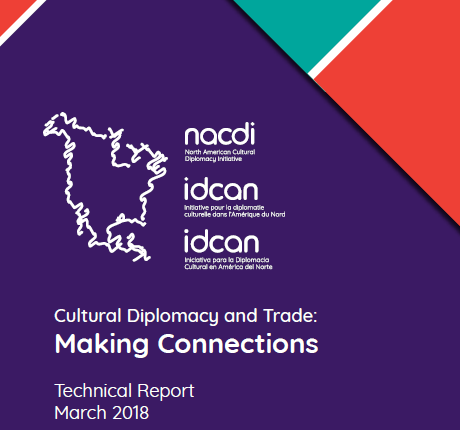On March 7, 2019, NACDI launched its report Culture and Trade: Making Connections with an event at Trinity College at the University of Toronto. Co-organized with the Bill Graham Centre for Contemporary International History, the event began with a welcome by Director John English.
Sarah E.K. Smith (Carleton University) gave a presentation outlining the report and NACDI’s approach to cultural diplomacy. She explained NACDI’s approach to cultural diplomacy is based on: an expansive and nuanced approach to the term culture; a belief in the necessity of relational, rather than transactional engagement; and an interest in understanding the significance of non-state actors in the current network environment of diplomacy. Rather than seeing the multifaceted nature of cultural diplomacy as a challenge, NACDI points to complexity as a reason to advance nuanced discussions, including the recognition of a wide-range of actors and activities, and well-developed indicators that have specific qualitative and quantitative measurements. Smith explained that the report demonstrates that cultural diplomacy and trade are intrinsically linked, and that investment in cultural diplomacy results in a corresponding impact in trade. She outlined the four part structure of the report, which begins by emphasizing the need for common language to facilitate conversations between policymakers, practitioners, and academics. Next, the report addresses the history of Canadian cultural diplomacy and trade, suggesting that Canada needs to understand its successes in cultural diplomacy to date in order to establish and build on best practices. Third, the report engages with the thorny issue of metrics as a means to monitor and demonstrate the impact of Canada’s cultural diplomacy. Here, NACDI argues for comprehensive indicators that take into account short, medium, and long-term assessments, and that utilize qualitative and quantitative measurements. The fourth component of the report addresses a range of case studies from Australia, Japan and South Korea. These provide strategic information as to how other nations are utilizing cultural diplomacy, specifically with regards to creative industries and trade.
This presentation was followed by a lively panel discussion moderated by Sascha Priewe (Royal Ontario Museum). Panelists included: Lynda Jessup (Queen’s University), Christine Nakamura (Asia Pacific Foundation of Canada), Salvador Alanis (Institute for Cultural Exchange – Americas), César Villanueva Rivas (Universidad Iberoamericana), and Ben Schnitzer (Queen’s University).
